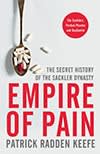Think Again: The Power of Knowing What You Don’t Know
by Adam Grant, WH Allen £20/Viking £28
Grant invites readers to take a scientific approach, learning from mistakes and adapting to new evidence in pursuit of self-improvement and better exchanges of ideas. This is a thoughtful and research-packed invitation to maintain an open mind and, where necessary, rethink previous convictions.
Demanding More: Why Diversity and Inclusion Don’t Happen and What You Can Do About It
by Sheree Atcheson, Kogan Page £14.99/$19.95
Born in Sri Lanka but adopted by a working-class, Northern Irish family, Atcheson’s name and accent give no clue to her colour or origins. Her background, though, gives her plenty of personal experience and perspective on diversity, equity and inclusion in the workplace, in this straightforward collection of advice and interviews with experts.
How to Change: The Science of Getting from Where You Are to Where You Want to Be
by Katy Milkman, Portfolio $28
Change is “a chronic challenge, rather than a temporary one” and must be treated as such, according to Milkman, a behavioural scientist with an engaging capacity to delight in her own discoveries about how habits are formed and altered. An entertaining run through the best and latest science on change and how to achieve it.
Crossing Continents: A History of Standard Chartered Bank
by Duncan Campbell-Smith, Allen Lane £40
A heavyweight account of Chartered Bank and Standard Bank, which later combined to form Standard Chartered, where they came from and what they became. As an authorised history, the book perhaps inevitably soft-pedals StanChart’s more recent problems but, reviewing for the FT, Philip Augar praised it as a “compelling record of imperial and post-imperial banking, the white men responsible and the lives they led”.
Amazon Unbound: Jeff Bezos and the Invention of a Global Empire
by Brad Stone, Simon & Schuster £20/$30
The growth of Amazon over the past decade justifies this sequel to Stone’s bestseller on Amazon’s early years, The Everything Store. The book is full of new detail about how its founder spun the “flywheel” of customer-centric demand and repeated innovation, and inevitably ran into new political and commercial controversy in the process of creating a vast technology empire.
Framers: Human Advantage in an Age of Technology and Turmoil
by Kenneth Cukier, Viktor Mayer-Schönberger and Francis de Véricourt, WH Allen £20
This is a tightly written prescription for smart thinking based on our unique ability to frame or reframe problems, “harnessing mental models to elicit options” in order to reach better solutions. It starts as a conventional mix of research and storytelling. It turns into a bold call to reinject pluralism and progressive human values into a decision-making process increasingly and dangerously dominated by algorithms or gut instinct.
Empire of Pain: The Secret History of the Sackler Dynasty
by Patrick Radden Keefe, Doubleday $32.50/Pan Macmillan £20
A gripping and thorough investigation of the saga of the Sackler dynasty and the addictive painkiller OxyContin, developed and marketed by Purdue Pharma, the company owned by two of the Sackler brothers and their families. The FT’s John Gapper wrote that Keefe brought to this “tour de force”, a “coolly prosecutorial prose style, backed by voluminous research” into the Sackler’s links to the drug, and the philanthropy that burnished their reputation.
Fall: The Mystery of Robert Maxwell
by John Preston, Viking £18.99
The colourful career of the media magnate and his mysterious death — did he fall from his yacht in 1991, or jump? — are captured in this sweeping account of Maxwell’s motivation, from the horror and chaos of the Holocaust and its aftermath, to head-on competition with Rupert Murdoch in the 1980s. The book’s “strength is in telling the grand sweep of an extraordinary life”, Bronwen Maddox wrote in her FT review.
The World for Sale: Money, Power and the Traders Who Barter the Earth’s Resources
by Javier Blas and Jack Farchy, Random House Business £20/Oxford University Press $29.95
This tale of the rise of commodity traders, from the 1970s to the supercycle of the 2000s, also tells the story of the vast geopolitical trends that enriched them, including nationalisation in the Middle East and breakneck privatisation in the disintegrating Soviet Union. Former FT journalists Blas and Farchy impart colourful details that give the book a “thriller-like quality”, Felix Martin wrote in his review.
How Boards Work: And How They Can Work Better in a Chaotic World
by Dambisa Moyo, Bridge Street Press £25/Basic Books $30
As a non-executive on several boards, Moyo offers a considered insider’s account of how to deal with modern boardroom dilemmas, including the challenges of changing corporate culture, and instilling greater diversity and purpose. The FT’s John Plender said the book provided “thoughtful analysis and reform proposals against which boardroom sophisticates can usefully test their assumptions”.
Andrew Hill is the FT’s management editor
Join our online book group on Facebook at FT Books Café











